DIVISION OF ENVIRONMENTAL ASSISTANCE AND CUSTOMER SERVICE






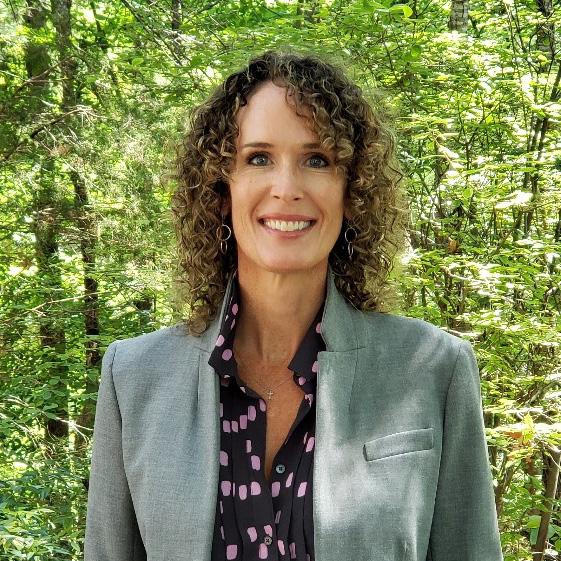


DEACS is excited to share the 2023-24 biennial report with you. The past two years have been very productive, and we are pleased to share some of our activities, highlights and accomplishments which have a direct impact on the state’s strong economy and environmental protection.
As you will see in the report, our work is diverse across the state. The DEACS team offers grants; helps entities navigate the permitting process; supports economic development; recognizes and assists organizations going beyond compliance; provides direct on-site technical assistance; serves as a customer service liaison for DEQ; and offers training and networking opportunities.
Our team has grown significantly through the addition of eight new positions to expand and increase the services we offer. We also received additional funding to provide more grants for recycling infrastructure through legislative support and

We hope you find this report insightful and that it encourages you to reach out to DEACS to determine how we may be able to help you. Thank you for taking your time to learn more about us.
Best Regards,

Jamie Ragan, DEACS Director






DEACS is a non-regulatory division in the North Carolina Department of Environmental Quality (DEQ) which protects the state’s natural resources for the health and prosperity of all North Carolinians. The division accomplishes these goals by encouraging sustainable practices, advancing recycling efforts, reducing waste generation and disposal, and promoting more efficient resource consumption. The division also strives to promote going beyond regulatory compliance and help customers navigate environmental permitting. With a staff of more than 65, the division is organized in four sections: Environmental Assistance, Recycling and Materials Management, Waste Reduction Partners and Regional Office Operations and Administration.
Navigate regulatory and permitting challenges.
Use resources responsibly and move toward a more circular economy.
Achieve and be recognized for environmental excellence.
Interact with and access DEQ programs through seven regional offices.
Implement our pollution prevention strategies.
Grow local economies and create jobs.
Understand how to address environmental problems.
Coordinate the State Environmental Protection Act (SEPA) process.
Experience customer service excellence.
Access grant funding and assistance to improve recycling infrastructure.
TECHNICAL SUPPORT
DEQ Toll-free Hotline
Environmental and Pollution Prevention Assistance
Permitting Guidance and Compliance Assistance
RECOGNITION AND LEADERSHIP PROGRAMS
Environmental Stewardship Initiative
NC GreenTravel

RECYCLING AND MATERIALS MANAGEMENT
Recycling Business Assistance
Local Government Assistance
Grant Programs
PROGRAMS
Recycling Campaigns
DEQ Prosperity Zone Liaisons
Webinar and In-person Training
RESOURCE AND ENERGY EFFIENCY
On-site Assessments
Networking and Benchmarking Events
Waste Reduction Partners
REGIONAL OFFICE OPERATIONS
Office Management
Express and Scoping Meeting Facilitation
Financial Management


DEACS Environmental Assistance Coordinators (EAC), provide non-regulatory, on-site consultation and coordinated permit reviews for proposed projects. They are conveniently located within the seven regional offices close to our customers. Their primary responsibility is to assist businesses, industries, local governments, other institutions, consultants, and private citizens to identify, understand and comply with the state’s environmental requirements.

EAC provide permitting assistance tailored to individual customer needs. The coordinator also provides personalized guidance through each step of the permitting process. Regional environmental coordinators provided clients with at least 140 customized permit lists in FY 2023 and 127 in FY 2024.
EAC staff provides coordination and assistance to clients to facilitate expedited permitting decisions within the Express Permitting Program. This assistance is a key component that can lead to more timely permitting decisions in relation to DEQ regulatory requirements. Projects that involve the following permits may qualify for express permitting: CAMA Major, Erosion and Sediment Control, Post-Construction Stormwater (only available in 20 coastal counties), and Stream Determinations. In the past two years, Environmental Assistance Coordinators took part in a total of 519 DEMLR Express Permitting meetings.
The DEACS staff arranges and leads multi-agency meetings for permitting applicants and their consultants to connect with federal and state permitting and resources agencies. These meetings aim to assist with the permitting processes, offer guidance to prevent and minimize environmental impacts, explain the distinction between requirements and recommendations, and recognize potential obstacles and how to avoid them. EAC staff facilitated 121 multi-agency meetings in FY 2023 and 99 in FY 2024.

In 2023 Cameron Weaver, Environmental Assistance Coordinator in the Wilmington Regional Office, supported U.S. military installations by organizing three multi-agency meetings for environmental permitting of construction projects and numerous Express Permit meetings. These efforts resulted in the issuance of Express Permits by the Stormwater and Erosion Control programs within the Division of Energy, Mineral, and Land Resources (DEMLR) for military projects in the Wilmington Region. In 2022, over 45 DEMLR Express Permits were issued for military projects, and in 2023, more than 17 were issued.


The DEQ Small Business Environmental Assistance Program (SBEAP) provides free, confidential, and nonregulatory technical assistance to small businesses across North Carolina. Staff engineer Tony Pendola recently worked with Andersen Products, a commercial sterilizer/ manufacturer which developed an innovative process to substantially reduce the use of ethylene oxide (EtO) in sterilization. Mr. Pendola facilitated the engagement of Andersen Products on an EPA review panel, facilitated on-site visits to provide critical feedback on new national rulemaking on EtO use, and provided permitting and compliance assistance.
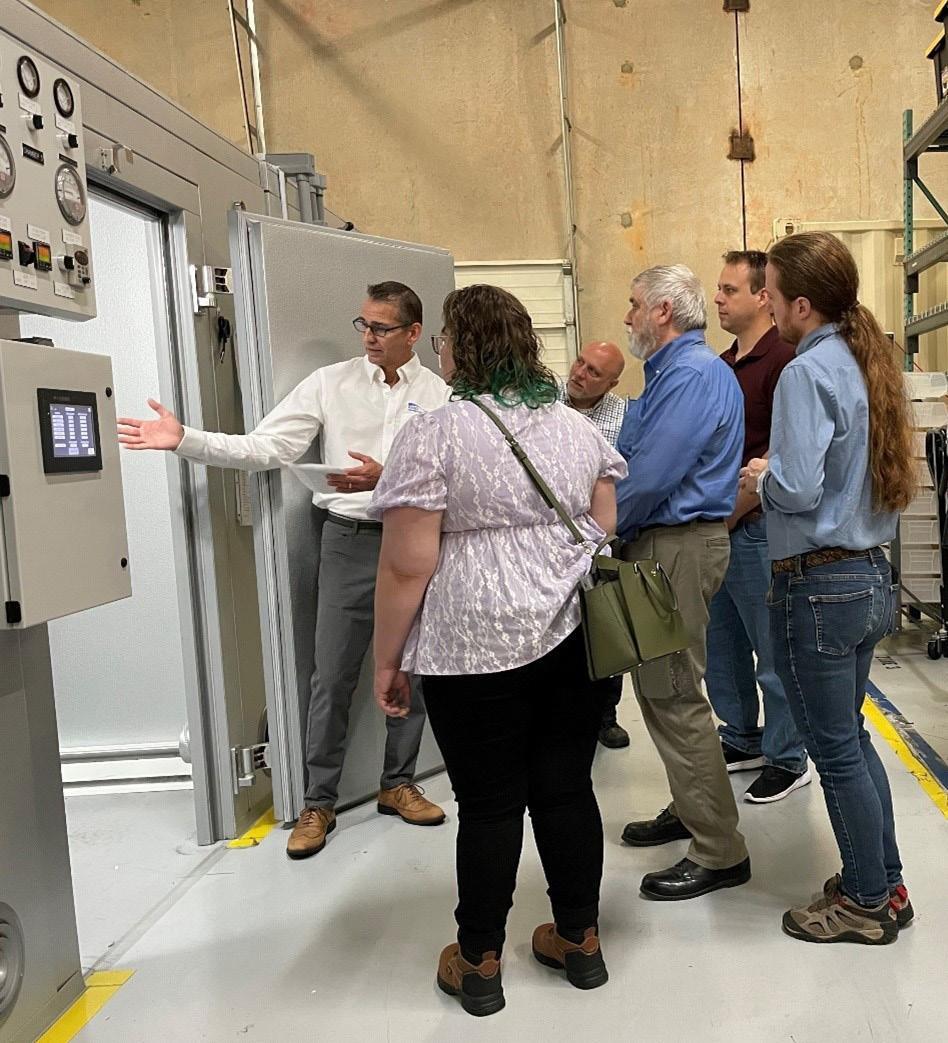
Site visit with EPA rule writers, supervisor, and regional office.
“We are fortunate here in North Carolina to have experts who take an interest not just in our regulatory compliance, but in our growth and success as a North Carolina Company..”
William K. Andersen, M.D., F.A.A.O.S., CEO Andersen Sterilizers, Inc.
Recently, the Division of Marine Fisheries (DMF) requested that the Environmental Assistance Coordinators schedule and facilitate a meeting to discuss the creation and monitoring of artificial reefs and oyster sanctuaries in North Carolina coastal waters. Staff from state and federal regulatory and resource agencies were invited to a meeting to discuss the construction of two new estuarine artificial reef sites for oyster sanctuary habitat and enhance two existing sites all positioned in the Pamlico Sound. The success of this project hinged on comments from the US Army Corps of Engineers, Division

of Coastal Management, Division of Water Resources, US Coast Guard, US Fish and Wildlife, National Oceanic and Atmosphere Administration Fisheries, State Historic Preservation Office, Division of Energy, Minerals, and Land Resources, and N.C. Wildlife Resources Commission.
On March 12, 2024, DMF received a major permit for the creation of Maw Point and Brandt Island Oyster Sanctuary and the placement of additional reef development material for existing artificial reefs AR-296 and AR-298.
Businesses and institutions can call on DEACS staff to provide on-site, one-on-one technical assistance to help achieve their environmental performance goals. Unique to NCDEQ, these technical assistance services address resource efficiency, recycling, water and energy-use management, greenhouse gas emission reduction, pollution prevention and sustainability strategies.
In October 2022, Tri-Hishtil, a plant grafting greenhouse in Mills River reached out to Waste Reduction Partners for help finding a recycler for their harder-to-recycle, high impact polystyrene seed trays. With a dedication to waste reduction, Tri-Hishtil was already baling cardboard and plastic films for recycling in nearby Asheville. WRP connected them with Verity Recycling, a specialty agricultural plastics recycler that is now processing 24 tons of seed trays annually and saving Tri-Hishtil about $70,000 on waste disposal.
The American Red Cross engaged Waste Reduction Partners’ on-site consultative services to identify environmental and energy management improvements for four pilot operation centers across North Carolina in 2022 and 2023. The assistance focused on energy management, waste reduction, recycling, water efficiency practices and is being utilized to craft a national program to reduce the Red Cross’s environmental and carbon footprints.


“Tri-Hishtil is proud of the fact that we recycle, and we appreciate WRP’s help in finding markets for our recyclable materials. Last year we saved about $70,000 on trash pickup!”
Yulia McBride, Operations Manager Tri-Hishtil
The Environmental Stewardship Initiative launched a diagnostic equipment loaner program for members seeking to improve energy management performance. The equipment ranges from an infrared camera, ultrasonic leak detector, and light meter to AC recording probes, power quality and data loggers.
In December 2022, ESI staff, Don Burke worked with Mattamy Homes in Cary to evaluate the performance of home insulation products using the infrared camera. ESI and WRP staff supported Precor Manufacturing in Whitsett to undertake a compressed air leak repair program. WRP staff trained Precor technicians on the use of the detector and provided a spreadsheet tool to quantify energy and cost savings. Precor tagged and repaired 45 leaks, measured a 21 percent reduction in compressed air leakage, and estimated utility cost saving of $12,300 per year for the initiative.

Wicked Weed Brewing continually seeks to enhance its strong environmental sustainability programs. In October 2022 Wicked Weed engaged Waste Reduction Partners to assist with a waste stream sort to help optimize management practices. The project team analyzed the garbage stream to measure the amount of recyclables and compostables that slipped in, and the team also analyzed the recycling stream to determine the percentage of contamination. Later in March 2023, WRP staff conducted a greening assessment for Wicked Weed’s Brew Pub in Asheville addressing energy and water efficiency, recycling and food waste reduction efforts. Wicked Weed recently joined both the NC GreenTravel and ESI recognition programs.

DEACS staff partnered with UNC – Asheville to support their “waste sort buffet,” an educational effort to highlight food waste awareness in their dining halls. A waste buffet displays the uneaten food in categories to visually show the volume of edible food that was discarded. UNCA’s cafeteria had a total of 237 pounds of food waste during one lunch period! Nearly 80 pounds were edible portions resulting from 530 meal ticket swipes. With 15 percent of this purchased food being wasted, event organizers hope to encourage behavioral changes to reduce food waste.



DEACS grant funding to local governments helps expand and improve recycling programs to collect more and higher quality recyclables, which is critical to growing the state’s recycling economy. During the most recent cycles, grant-funded projects helped local governments open new recycling drop-off sites, distribute effective recycling education to residents, and reinstate a curbside recycling program in Edenton after being suspended since 2020.
Cart tagging projects, which use educational materials such as cart hangers to inform residents of incorrect items placed in their recycling carts, have been successful in reducing contamination. With DEACS grant funding, the City of Rocky Mount focused their cart tagging program on the collection route with the highest contamination rate. Over three months, the effort successfully improved the recycling habits of 31.2 percent of households. As a result, the contamination rate for the specified route decreased by nearly 70 percent.
For the first time in more than 20 years, EPA awards federal funding to states for waste reduction and recycling infrastructure planning and development. In the fall of 2023, EPA awarded DEACS more than $612,000 through the Solid Waste Infrastructure for Recycling (SWIFR) grant program. DEACS will use the funding for three major projects:
The division will conduct a statewide materials management optimization study to better understand the composition of the state’s municipal solid waste and identify opportunities for source reduction and diversion.
DEACS will mount a statewide education campaign aiming to increase awareness about sustainable materials management, restore confidence in the recycling system, and improve recycling behaviors.
DEACS will provide additional grant funding to local governments for education and outreach projects to concentrate the RecycleRightNC messaging at the local and regional level.



State law requires the North Carolina DEQ to develop and periodically update a comprehensive statewide solid waste and materials management plan, with an objective of promoting alternatives to landfilling. DEACS and the Division of Waste Management are working together to develop the 10-Year Solid Waste and Materials Management Plan for the 2024-2034 cycle. Staff use public and stakeholder feedback to develop an action-based, achievable, and inclusive plan for the coming decade. inclusive plan for the coming decade.

In fall 2022, DEACS officially launched the Use the Food NC Campaign, drawing more than 60 attendees and featuring presentations from the N.C. Department of Agriculture and Customer Services, the U.S. and N.C. Composting Councils, EPA, City of Asheville, and Garbage to Gardens. The campaign aims to engage consumers, government, and businesses in reducing food waste by offering outreach materials, resources, and a food waste grant program. Following the launch event, DEACS found additional opportunities to bring various stakeholders together including two notable events in 2023 for food banks and food hubs across the state. DEACS staff continue to share and expand resources on the usethefood.nc.gov website, including a social media toolkit, resource map, hand-out guidance, business self-assessment guide, onsite consultations and more.
After the Use the Food NC campaign launch, DEACS awarded two rounds of the Food Waste Reduction grant to 23 organizations, investing $747,100 for state infrastructure. The goal of the grant program is to help local governments, non-profits and businesses reduce the amount of wasted food disposed at landfills by expanding food donation networks and composting operations. Collectively, the 2023 and 2024 grants are projected to provide 57,983 meals and divert 36,066 tons of organics from landfills.
Grant projects have already made an immediate impact. For example, McGill Environmental Systems was able to utilize its funding to build a food waste sort station at its Merry Oaks Facility. As a result of the new infrastructure, they were able to accept 16 tons of bananas that were no longer salable due to refrigeration issues during transport. Using the new pad, they were able to sort and compost the bananas, boxes, and pallets, turning them into premium soil amendments that will be used to help improve NC soils.


Established in 2013 within the Chapel Hill-Carrboro City School system, Every Tray Counts began as a campaign to reduce Styrofoam tray usage in school lunchrooms. The volunteer group evolved into a 501(c)(3) non-profit with a mission to prioritize compostable trays and food waste diversion. They created a school kit with a lunchroom composting startup guide, posters, and educational resources. School closures during the COVID-19 pandemic hindered efforts. Recognizing alignment with the DEQ Use the Food NC campaign and the value of the developed resources, board members helped DEACS assume program responsibility in early 2023. As of 2024, staff progress includes launching a pilot program, rebranding, website development, and widespread resource distribution to ensure ongoing support.


DEACS provides the administrative support for DEQ’s seven regional offices, including customer service, lease and space management, budgeting, operational logistics, and emergency operations.
Each regional office connects the Department to the surrounding community and addresses the unique needs, customers, demographics, industries, and geography, creating variations in workloads, activity levels and decision outcomes.
The administrative workload in each office is specifically tailored to the needs of the regulatory programs staff at each location.
Customer assistance and outreach
Fiscal management
Support to DEQ permit and inspection staff
Facility improvements
Electronic records transition and management

Daily processing of deposits and audits of permit fees
Entering data into permit tracking databases
Tracking and recording of monthly and annual inventories
Conducting fire and risk inventory assessments
Managing safety equipment and state vehicles
Assisting with file reviews and public records requests
DEACS held its first cross-training event for all administrative staff, aimed at improving customer service. This event brought together administrative assistants from all seven regional offices, fostering improved collaboration and a unified approach to serving our clients. Staff engaged in team-building exercises that not only strengthened their relationships but also provided a platform for sharing best practices across different regional offices.
A comprehensive overview of DEQ and DEACS, presented by Eula Alexander, Regional Office Operations & Administration Section Chief, Andrea Knight, HR Representative, and Jamie Ragan, DEACS Division Director, provided the administrative team with deeper organizational information to deliver efficient, knowledgeable and responsive customer service.
Learning new online permit application processes and tracking.
Adapting DEACS workflows to accommodate a more modern DEQ.
Gathering and analyzing staffing information to assist in lease renewal development.
Assisting a growing DEQ staff with new priorities determined by various federal funding sources.






$ 991,681
Local Government Recycling Grants Awarded

Environmental Stewardship Initiative Members Sites

$1,303,500
Recycling Business Development Grants Awarded

NC GreenTravel Members
DEACS staff led NCDEQ’s first waste sort of its Green Square headquarters in November 2022. With support of many volunteers, staff sorted and characterized a oneday sample of waste generated at Green Square. The results showed that a full 52 percent of the materials were compostable and another 25 percent were recyclable in the existing programs offered in the building.
Recycling signage was improved in 2023 and a pilot composting program was launched in April 2024. During this first month, Green Square staff diverted 210 pounds of organics from the landfill, avoiding 22 pounds of methane and producing enough compost to grow 158 tomato plants! N.C. Department of Administration is monitoring the DEQ pilot to determine if there is an opportunity for broader deployment of composting programs at other state agencies.
The NC GreenTravel Program helps North Carolina’s tourism businesses improve their brand through being more environmentally sustainable. By earning recognition, these businesses showcase their best practices, contributing to a more eco-friendly and prosperous travel industry in North Carolina.


DEACS staff manages DEQ’s toll-free hotline, fielding customer calls and leading the department’s response to customer needs. Their technical expertise addresses questions and guides callers to appropriate staff. Historically, 85 percent of calls are handled through programs administered by DEQ. During this two year period, 15,237 calls were fielded by the hotline.

Established in 2002, the Environmental Stewardship Initiative’s mission is to assist organizations in reducing their environmental impacts beyond regulatory requirements and recognize those that achieve and maintain this commitment.
The Environmental Stewardship Initiative (ESI) is unique from other state and federal efforts because it provides no-cost training, education, networking and technical assistance to help members improve their environmental performance and pollution prevention objectives. These ESI trainings and technical assistance opportunities are provided through peer sharing events among members to advance environmental management systems, sustainability and beyond compliance efforts. This program approach leverages technical and organizational resources across member businesses, industries, local municipalities, and government agencies far beyond those that can be provided by ESI and DEQ.
MEMBERS’ TWO YEAR REDUCTIONS AND SAVINGS


Members are encouraged to address all significant environmental impacts, including air, water, waste, energy and resource consumption, through their environmental management system goals.

ESI Members Mentoring at ESI Annual Conference.
Waste reduced more than 901 tons
The energy toolkit developed by ESI allows clients to analyze energy usage and identify areas where pollution prevention strategies can be deployed to reduce their energy consumption. These tools are available at no-cost to members and can be used to achieve energy efficiency and carbon reduction targets. The ESI Energy Toolkit is especially valuable to those organizations that do not have the internal resources needed to achieve their energy management strategy. With these diagnostic tools, paired with experienced guidance by Waste Reduction Partners engineers, ESI members can reduce energy costs, greenhouse gas emissions and improve environmental resiliency. Not only will these actions prevent pollution, they contribute to achievement of the N.C. DEQ Clean Energy Plan and N.C. Executive Order 80.
The ESI Environmental Benchmarking Series (EBS) is designed to facilitate peer-sharing of information and opportunities for attendees to learn from each other. ESI members host events that focus on a specific environmentally related topic. Those in attendance get a rare opportunity to see how another organization achieves its environmental performance goals or compliance obligations and can take that information and know-how back to their own facility. All events include real world application of environmental efforts, networking opportunities and tours of implemented projects. Uchiyama Manufacturing America-LLC in Goldsboro hosted an EBS in 2023 on the benefits of using ProMoss to eliminate chemical use in industrial chillers, cooling towers and effluent wastewater tanks.

Eaton RPO (Raleigh Production Operations) joined the ESI as a Partner in 2010 and rose to the Rising Steward level in 2012. Eaton RPO was recognized as a Steward by DEQ Secretary Elizabeth Biser during an in-person ceremony and plant tour on April 18th, 2023.

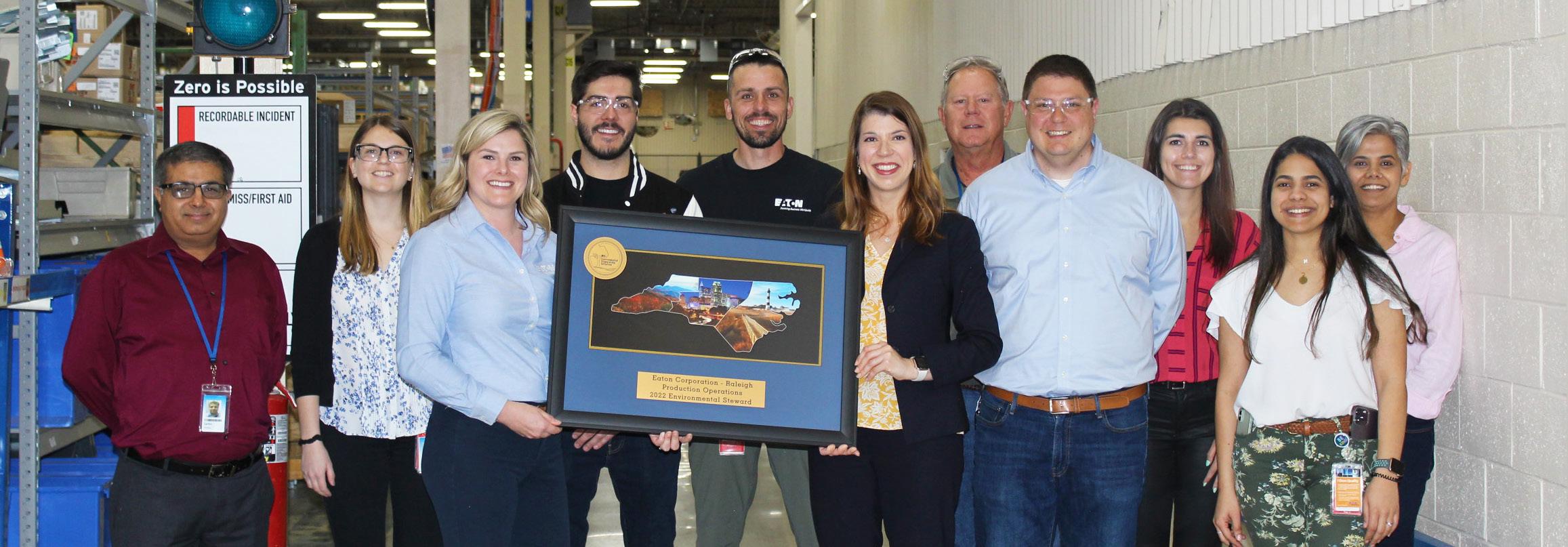







Secretary Elizabeth Biser formed the North Carolina Circular Economy Council to identify ways to expand and accelerate beneficial impacts of recycling in the state. Members of the Council include leading recycling companies, non-profit organizations, industry associations, and product manufacturers. DEACS supports the Council’s promotion of innovative materials management solutions, such as business and infrastructure development.
In its first year, the Circular Economy Council invited state leaders to tour a series of leading and innovative recycling facilities. DEACS staff coordinated with Council members and organized three separate facility tours to provide local and statewide leaders with an in-depth look at the operations behind the recycling process and perspective on the larger circular economy. Decision-makers were given tours of Southeastern Container, a Coca-Cola Consolidated PET preform and bottle manufacturer, Unifi Inc., the manufacturer of REPREVE fiber from 100 percent PET recycled materials, and Powerhouse Recycling, an IT asset and electronics recycler which also opened North Carolina’s first dedicated solar panel recycling line this past year.


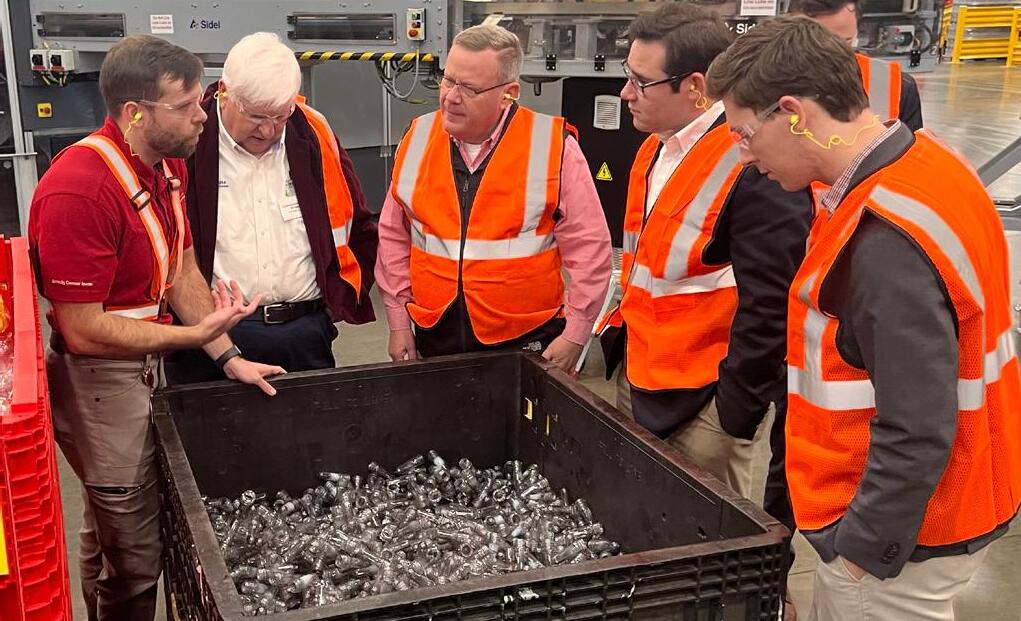
DEACS’ Recycling Business Assistance Center (RBAC) continues to stimulate growth and expansion in the private recycling industry through its Recycling Business Development Grant Program. During FY 2022 and FY 2023, DEACS awarded 31 grants to North Carolina recycling businesses and nonprofits, resulting in additional annual recycling of 83,742 tons of material and 157 jobs created.
Gateway Recovery processes coaxial cables, a highly landfilled material, and recovers 95 percent of the cables’ metals for resale to domestic mills. Recently the company began using the recovered plastic to make plastic lumber for fence posts and other uses, diverting even more materials from the landfill and circulating them back into the economy. DEACS awarded Gateway Recovery a grant to purchase a shredder to enhance its capacity to recycle coax cables, which is expected to divert 500 tons of material annually.

“North Carolina has an opportunity to further advance the circular economy by ensuring that the state’s infrastructure and markets support productive economic use of end-of-life materials”.
Elizabeth


Biser, Secretary State of North Carolina


Environmental compliance reviews (ECRs) are performed when businesses are applying for job development investment grants (JDIGs). These grants are available for new and expanding companies to help offset expansion and/or locating costs. JDIGs are based on North Carolina Department of Commerce (N.C. Commerce) criteria for operation via the One North Carolina Fund (OneNC). The OneNC Fund is a discretionary cash-grant allowing for quick response to job creation projects. Previously a N.C. Commerce responsibility, DEACS has taken over the ECR process.

To complete an ECR, the regional Environmental Assistance Coordinators review the project information including location, industrial processes, and whether it’s a new site or expansion. The EAC then creates a compliance report form for the project, and DEQ regulatory program staff are contacted for historical compliance information and potential permitting suggestions. The Environmental Assistance Coordinator also gather information from internal and external sources including state database searches and U.S. EPA’s Enforcement and Compliance History Online database (ECHO). This information is compiled, summarized, and added to the final ECR report, which is shared with the Secretary’s office for submission to N.C. Commerce.
DEACS completed 48 ECRs in FY 2023 and FY 2024. These projects will lead to the creation of more than 15,393 jobs and a total capital investment of as least $13.8 billion.


Green Metals Inc., a wholly owned subsidiary of Toyota Tsusho America, announced a new facility location in Liberty that will create almost 50 jobs and is projected to invest more than $198 million in the N.C. facility. This facility will support the handling and recycling processing for Toyota’s EV battery manufacturing facility that will create an additional 5,000 jobs in Randolph County.
DEACS has awarded a recycling business development grant to GMI to support the purchase of recycling processing equipment for the EV and material handling operation.
“GMI will play a critical role in the EV battery ecosystem by ensuring safe and advanced waste processing, helping the company achieve its goal of ‘battery-to-battery recycling’ which benefits all of us.”
Kevin Franklin, President Randolph County EDC

Electric Vehicle (EV) Material Manufacturer Epsilon Advanced Materials, Inc, a subsidiary of Indian-based Epsilon Carbon Private Limited, has announced that it will be building its first U.S. plant at the Brunswick County Industrial Park/ New Hanover Mega Site. This 1.5 million square foot facility is scheduled to break ground in 2024 and be operational by 2026. The plant will develop and manufacture “high performance” synthetic graphite for anode components that will be utilized in lithium-ion (LI) EV batteries. The project is expected to create at least 500 new jobs with a capital investment of more than $640 million.
This project was facilitated by grant incentives through the Job Development Investment Grant (JDIG) program. DEACS staff provided project support through facilitation of a JDIG compliance evaluation, a pre-application site visit, and preliminary permitting information.
The Epsilon Advanced Materials project has been achieved through joint coordination and partnerships with N.C. DEQ, N.C. Commerce, EDPNC, the N.C. Community College System, N.C. Ports Authority, N.C. DOT, N.C. Railroad Co., Brunswick County Economic Development, among others.

Siemens Mobility, Inc., a division of Siemens AG headquartered in Munich, Germany, has announced that it will build its first East Coast manufacturing facility in Lexington, North Carolina. The 200-acre site is scheduled to begin production in 2024 and will manufacture advanced passenger rail cars and provide revitalization services for rail coaches and locomotives. The project will create more than 500 new jobs, with an average salary of over $51,000, while making a capital investment of more than $200 million dollars.
Siemens Mobility is a leading provider of transport services, including mobility management, rail electrification, rolling stock, and customer services. This new Davidson County facility is planned to be carbon-neutral once completely operational and is estimated to grow the North Carolina economy by at least $1.6 billion.
This project was facilitated by grant incentives through the Job Development Investment Grant (JDIG) program and incentives through the federal Infrastructure and Jobs Act. DEACS staff provided project support through facilitation of a JDIG compliance review and a multiagency meeting for preapplication permitting that also included representatives of NCDOT, and the U.S. Army Corps of Engineers.
The Siemens Mobility project has been achieved through joint coordination and partnerships with N.C. DEQ, N.C. Commerce, EDPNC, the N.C. Community College System, Davidson County Economic Development, Norfolk Southern, and others.

“Our manufacturing workforce and strong infrastructure will help Siemens Mobility succeed in Lexington.”
Roy Cooper, Governor State of North Carolina
North Carolina’s carbon emission reduction legislation, Clean Energy Plan, and Executive Orders 80, 216, and 246 will transform how energy is generated and consumed in the state. The DEACS team are helping navigate the permitting process for renewable and clean energy related projects, promoting the recycling circular economy with its carbon impacts, and delivering technical assistance to organizations striving to meet their decarbonization goals.
Many N.C. companies are challenged with addressing greenhouse gas emission reductions objectives driven by industry standards, international regulations and corporate mandates. With EPA grant support, Waste Reduction Partners is assisting three manufacturing sectors to conduct carbon accounting and identify energy and carbon emission reduction strategies to address these very aggressive decarbonization objectives. The grant is funding graduate level internships to support automotive, textile and food & beverage manufacturers to advance carbon management skills, knowledge and resources. Thus far the project has assisted:
Bombardier Recreational Products
Culp Home Fashions
Uchiyama Manufacturing
Oiles America Corporation
Wicked Weed Brewing
Bridgestone Tire
The WRP team has identified cost-effective energy saving projects totaling more that $502,000 for the above companies with the potential to cut their GHG emissions by 2,423 metric tons annually.
In June 2023, Uchiyama America, an ESI Steward, partnered with Waste Reduction Partners, the Land of Sky Regional Council and Duke University to undertake carbon emission accounting for their Goldsboro site. The project team pursued the following action plan:

Complete carbon accounting inventories for scope 1, 2 and 3 emissions.
Conduct energy efficiency and renewables assessments.
Create a road map plan to achieve target reductions.
The project created a carbon emission baseline, identified carbon reduction opportunities, created new key performance indicators for energy efficiency and addressed M2030 automotive supplier surveys and other reporting needs. The project findings and results were presented that the 2023 ESI Annual Conference.

Waste Reduction Partners engineers help state and municipal facilities identify energy efficiency and renewable projects to address North Carolina’s clean energy plans, Executive Order 80 and climate goals adopted by local governments. Supported by N.C. DEQ’s State Energy Office, WRP has worked with several state agencies to identify cost effective projects which can save selected buildings 20 – 50 percent in energy consumption. Projects have included Department of Revenue, Education, Transportation, Health and Human Services, Adult Corrections, ABC Commision and others. WRP has assisted the City of Hendersonville, Towns of Waynesville, Brevard and Davidson with energy saving strategies which help address their own adopted greenhouse gas reduction goals.


In 2023, Powerhouse Recycling opened a dedicated solar panel recycling line in Salisbury, N.C. making it the first facility of its kind in the state and on the east coast. Specialized machinery allows for 98-100 percent pure recovery of solar panel commodities; recovering the silicon, metals, glass, plastics, and aluminum. DEACS grant funding in 2023 and 2024 is supporting the purchase of a truck to expand transportation capability and a second glass removal system to double the line’s capacity.

The USDA provides grant funding to farms and rural small businesses to conduct energy saving upgrades such as lighting, ventilation, HVAC, center pivot irrigation and even robotic milking for dairies. WRP provides eligible businesses on-site energy assessments which are required for the USDA energy efficiency grant applications. Since July 2022, WRP engineers have provided more than 30
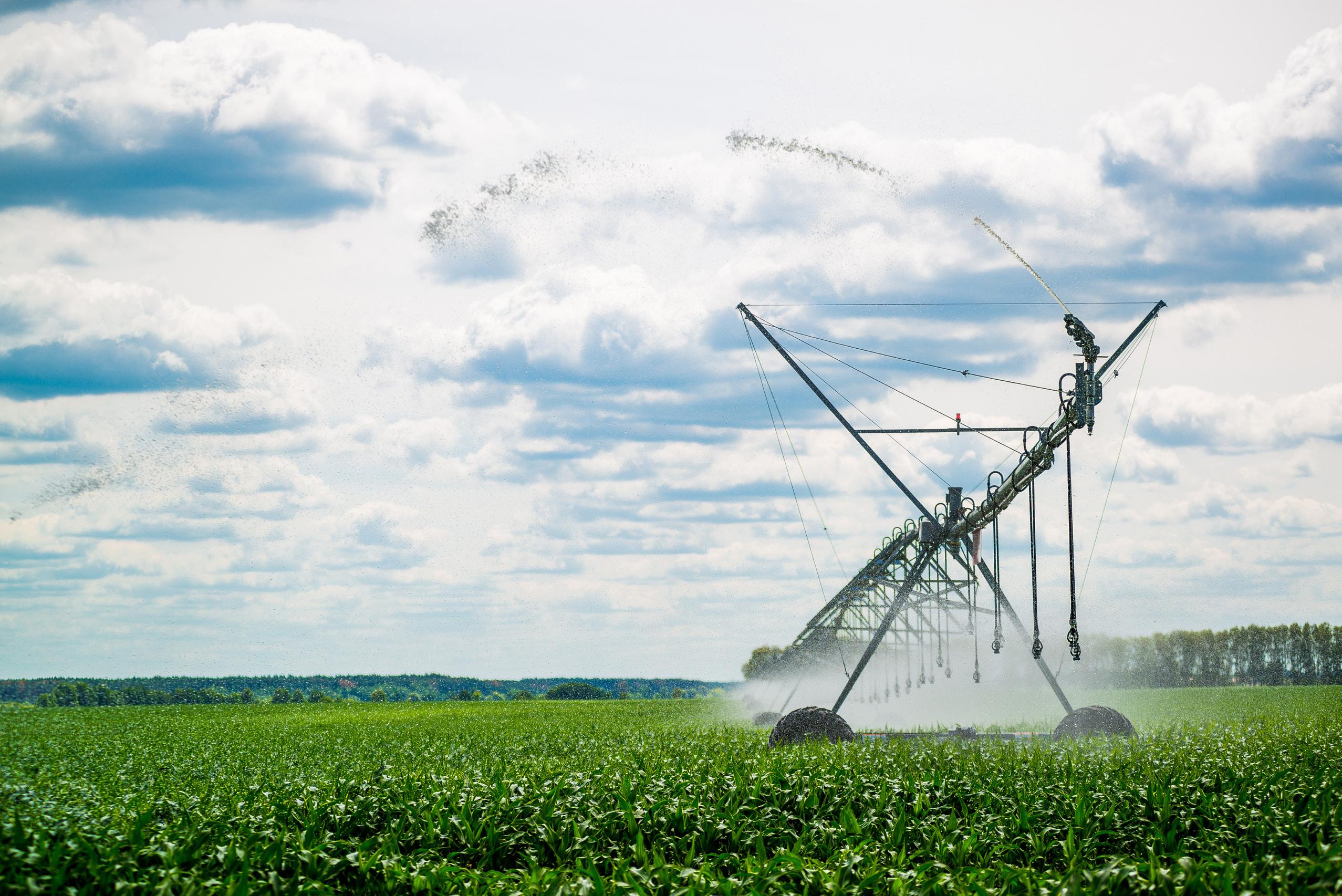
on-site energy assessments to farms and small businesses across 25 counties. The assistance is projected to reduce business utility costs by $430,900 and cut GHG emissions by 2,240 tons annually. Many of the businesses assisted have received direct USDA project funding totaling more than $516,000 including companies such as Aegis Power Systems and Multi-Cinemas Group.

The legislature granted DEACS an additional, one-time $500,000 for grantmaking to local governments, to be utilized in FY 2024-25 projects. As a result, DEACS awarded nine additional local government grants than the previous grant cycle for a total of 24. Nearly 750,000 North Carolinian households are expected to benefit from these grant investments. The increased funding focuses on local government recycling programs, providing services to more residents, improving the quality of recyclable materials used by manufacturers, and reducing the volume of materials sent to shrinking landfills.
These additional grants investment are supporting new curbside recycling programs which will offer individuals the convenience of recycling at home, while grants for cart stickers and educational materials will enhance existing curbside programs by reducing contamination and increasing participation. Other grant-funded projects will focus on away-from-home recycling programs, so residents can recycle bottles, cans, and paper at parks and special events like festivals and sporting events. Several communities will receive funding to improve and expand solid waste and recycling convenience sites. These projects include creating clear and informative directional signage, with DEACS design assistance, at convenience sites as well as installing large scale equipment like stationary compactors and roll-off containers to increase recycling capacity.
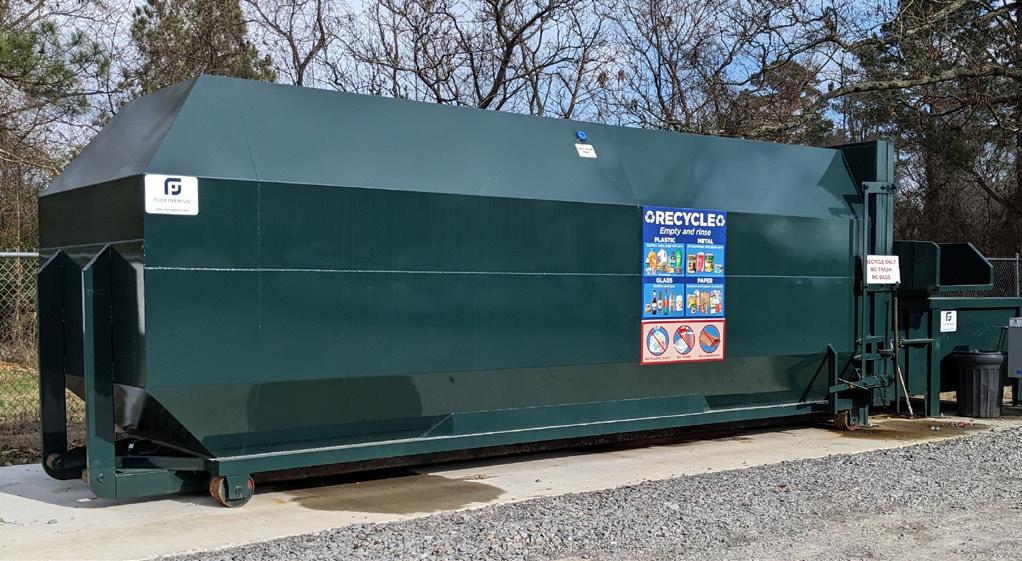
During the FY 2023 budget cycle, the State Legislature allocated funding for eight new DEACS positions. This noteworthy investment in new positions underscores the relevance, impact, and strength of the work undertaken by DEACS staff members. Across the state, more communities, businesses, institutions, and individual North Carolinians will receive environmental assistance and technical support.
The Recycling and Materials Management Section (RMMS) received four of these positions, which will provide support for program development, recycling businesses, and organics recovery. The Environmental Assistance Section received three positions, which will focus on permitting assistance and pollution prevention efforts. Lastly, Waste Reduction Partners received a new position to coordinate and expand on-site assistance work in pollution prevention, clean energy, resource efficiency and waste reduction efforts for businesses and institutions statewide.
LEADERSHIP POSITION TO FOCUS ON THE CIRCULAR ECONOMY
In May 2024, DEACS proudly announced that Wendy Worley accepted the Deputy Director position. Wendy joined DEACS in 2003 and had previously served as the Recycling and Materials Management Section Chief for six years. As an expert on recycling infrastructure and markets, Wendy will lead efforts to expand the state’s circular economy and foster economic development partnerships. She will also help lead the division’s strategic plan implementation and performance management.


To plan for future water supply needs of North Carolina’s growing population, local governments are required to produce Local Water Supply Plans and Water Shortage Response Plans for drought periods. Some municipalities implement year-round water conservation programs to promote efficient water use. DEACS supports these programs.
Many municipalities lack water conservation programs for industrial, commercial, and institutional (ICI) customers, who use nearly a third of public water supplies. Waste Reduction Partners (WRP) assesses water use in these sectors, offering guidance on reductions through repairs, best practices,
WRP contacted Durham Water Management as they planned an incentive program for hotels to upgrade toilets. The program offers up to $100 for each efficient toilet installed. WRP assesses and verifies existing toilets, evaluates overall water use, and provides recommendations. Durham Water Management requires a full WRP audit to qualify for the toilet cost share. Launched in 2021, the program has replaced 600 toilets, saving 742,000 gallons of water, with hotel assessments saving an additional 3,281,500 gallons and $42,156.
Mandy Freel, Energy & Water Manager at Buncombe County Schools, collaborates with WRP for water assessments in high water-use schools. Annually, three or four schools undergo comprehensive assessments, revealing and fixing costly problems. Examples of last year’s assistance include, updating cooling tower water metering to reduce sewer fees, upgrading a middles school’s restrooms with 0.5-gallon flush urinals to reduce water use by 37,620 gallons a year, and improving irrigation methods for a high school baseball field to cut costs by 50 percent. This assistance is supported by Asheville Water Resources Department, which has funded such efforts for fifteen years.
upgrades, and replacements. WRP, partnering with the Land of Sky Regional Council, supports ICI outreach for Asheville and Durham. Since 2014, assessments have saved 225 million gallons of water, amounting to $1.6 million in savings for water customers.


DEACS DIRECTOR
Jamie Ragan
DEPUTY DIRECTOR
Wendy Worley
PUBLIC INFORMATION
Katherine Lucas

Gwendolyn Palmer
Hiring, Section Chief
Lyn Biles, Permitting Assistance Supervisor
Marcia Allocco, Technical Assistance
Don Burke, Technical Assistance
Yolanda Graham-Gibson, Environmental Stewardship Assistance
Renee Kramer, Environmental Stewardship Assistance
Ron Pridgeon, Technical Assistance
Tony Pendola, Small Business Assistance
Hiring, Environmental Assistance Coordinator, Washington RO, SEPA
Hiring, Environmental Assistance Coordinator, Fayetteville RO
Cameron Weaver, Environmental Assistance Coordinator, Wilmington RO
Paul E Williams, Environmental Coordinator, WinstonSalem RO
Jesse McDonnell, Environmental Coordinator, Morrisville RO
Travis Smith, Environmental Coordinator, Asheville RO
David Lee, Environmental Assistance Coordinator, Raleigh RO
Heather Cashwell, Section Chief
Sandy Skolochenko, Program Development Coordinator
Eric MacDonald, Recycling Business Assistance Team Lead
Mike Greene, Recycling Business Assistance

Mark Boettger, Recycling Business Assistance
Laura McCoy, Recycling Business Assistance
Christine Wittmeier, Organics Recycling Specialist Team Lead
Hiring, Organics Recycling Specialist
Alex Miller, Community Technical Assistance Team Lead
David Hance, Community Technical Assistance
Delaney King, Community Technical Assistance
Hiring, Community Technical Assistance
Elise Traywick, Community Technical Assistance
Alexa Chumpitaz, Graphic Design (T)
Terry Albrecht, Section Chief
Angela Moore, Project Manager
Jan Hardin, Solid Waste Manager (LOSRC)
Kim Van Niekerk, Energy Program Manager
Tom Kimmell, Water Program Manager
Irena Rado, Office Manager
35 WRP Statewide Field Assessors (LOSRC), Employee of Land of Sky Regional Council
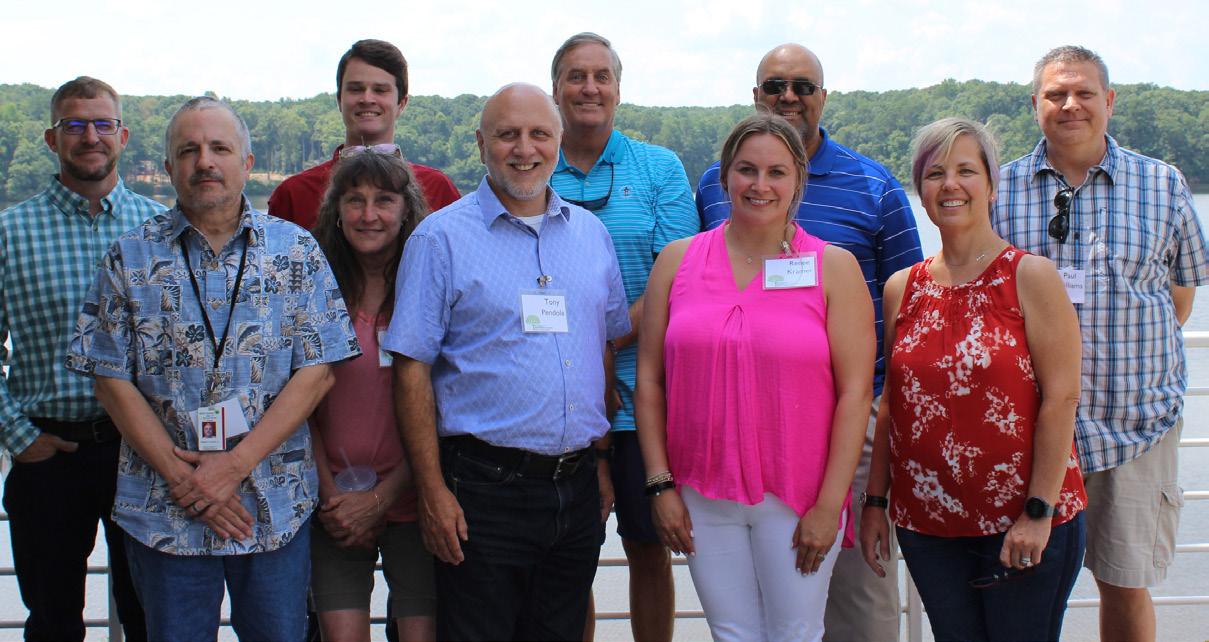


Recycling and Materials Management Section staff receiving the 2024 DEQ Distinguished Team Achievement Award.
SECTION CHIEF
Eula Alexander
ASHEVILLE RO
Linda Stamey, Manager
TaNeesha Dzioba
Lori Hicks
Stephanie Frady
Dave McKaig, (T)
FAYETTEVILLE RO
Lee Cottrell, Manager
Lehee Gower
Deven Williamson
MOORESVILLE RO
Angela Edmonds, Manager
Cathy Shipp
Deborah Luckman
Sherian Black
Trudy McNeil
Luz Lia, (T)
RALEIGH RO
Sandee Roof, Manager
Barbara Parker
Cheryl Richardson
Valerie Ealey
Audrey Hunter, (T)
WASHINGTON RO
Keri Sparks, Manager
Tabitha Fulford
Melanie McRoy
Matt Sides
Pamela Cade
Tammy Turnage, (T)
WILMINGTON RO
Patricia Hay, Manager
Jan Davis
Lisa Emmons
Tina Burd
Daisha Williams
Anne Jones, (T)
WINSTON-SALEM RO
Sandra Castle, Manager
Aurelia Bosemen
Sheila Mcintosh
Payge Jordan
Carlotta Winstead
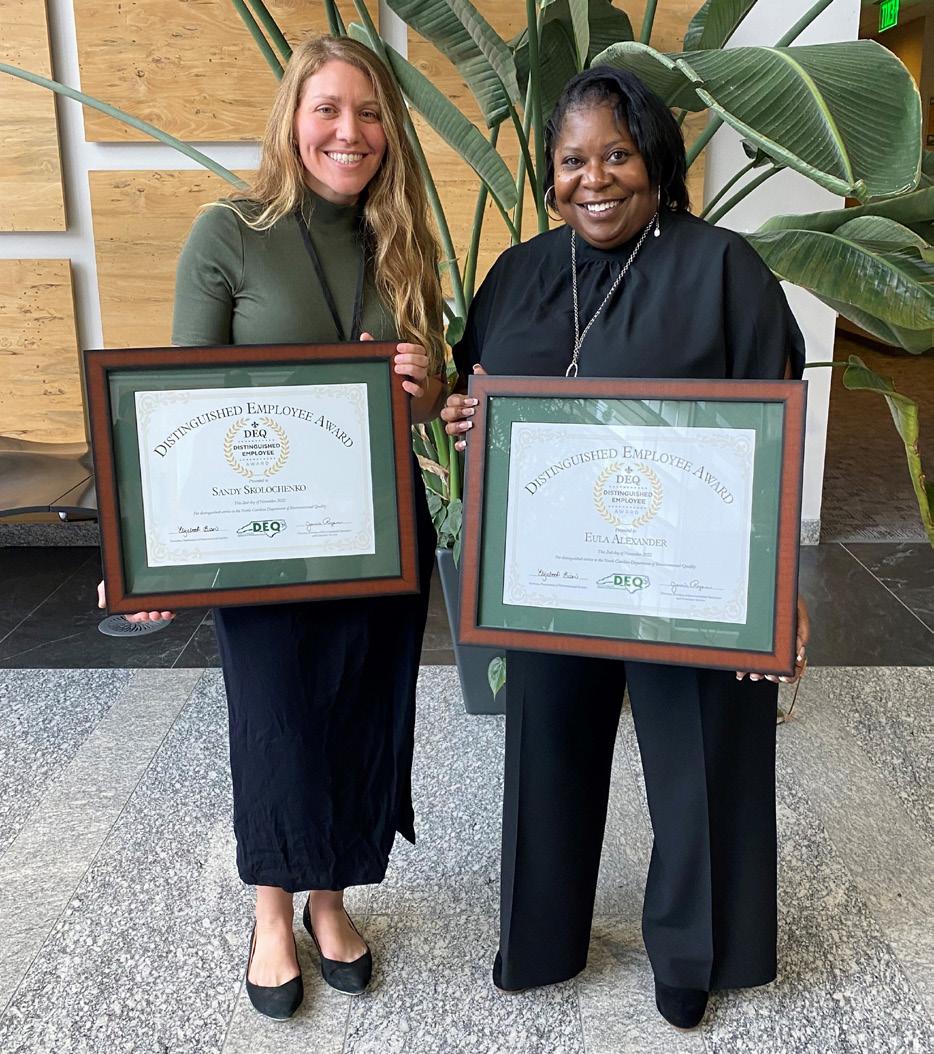
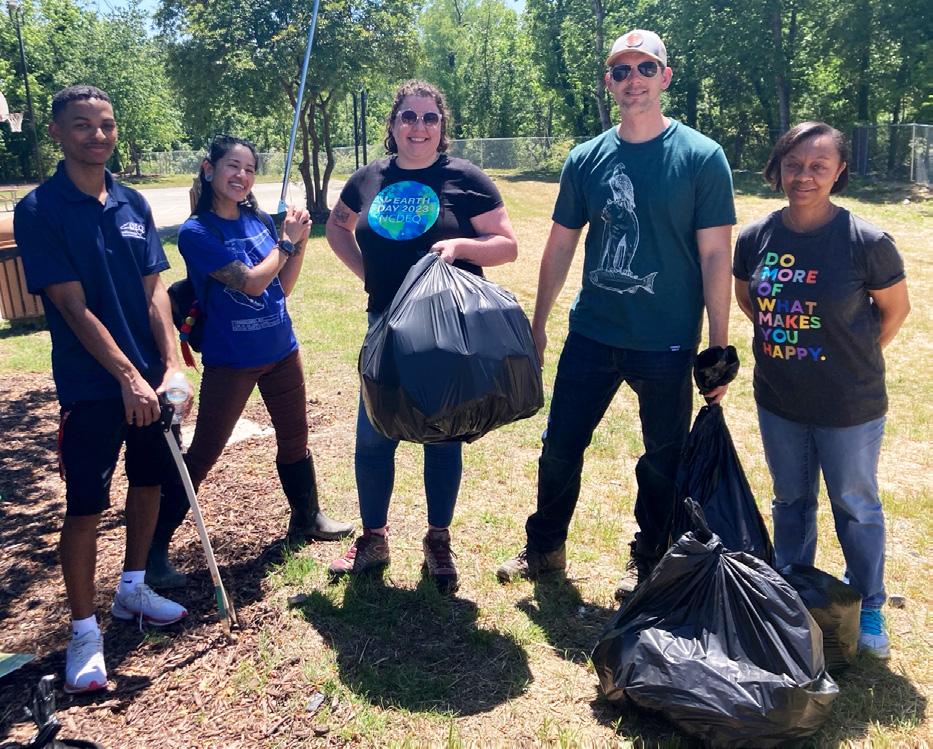


(T) = Temporary Employees Staff listing as of June 30, 2024.
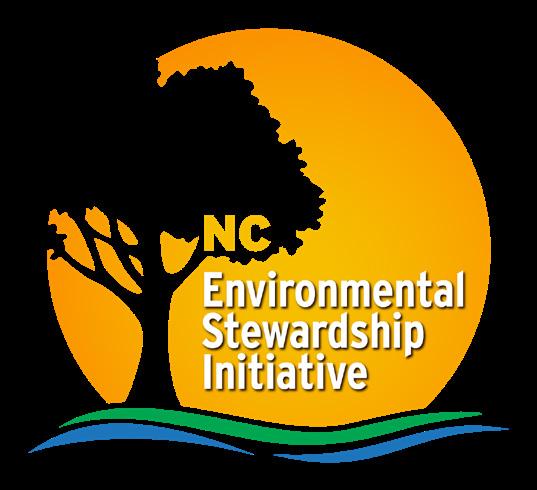



The North Carolina Division of Environmental Assistance and Customer Service (DEACS) is a non-regulatory division of North Carolina DEQ offering technical and financial assistance to businesses, manufacturers, local governments, institutions, economic developers and citizens in environmental management. For questions, call 1-877-623-6748.

